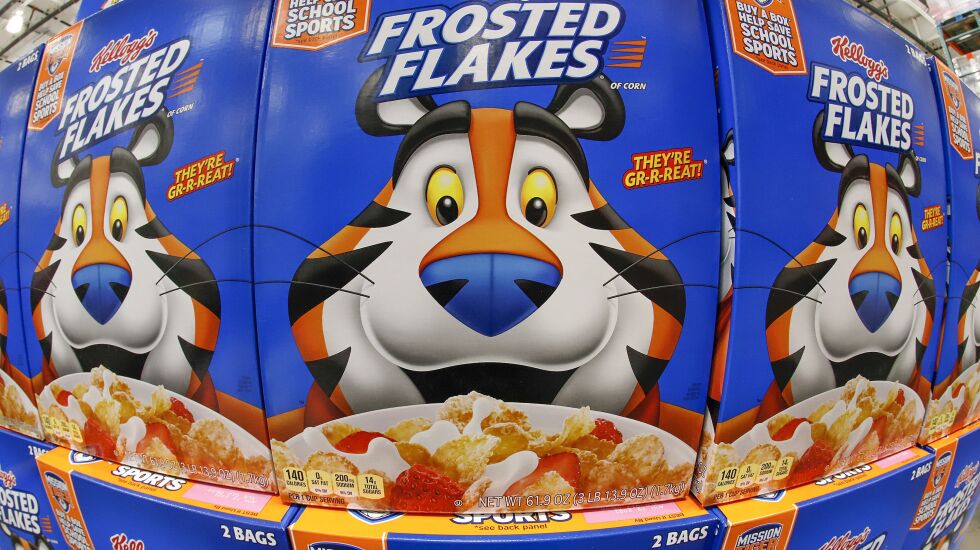
Kellogg Co., the maker of Frosted Flakes, Rice Krispies and Eggo, will split into three companies focused on cereals, snacks and plant-based foods. The largest of the companies will be based in Chicago.
Kellogg, which also owns MorningStar Farms, the plant-based food maker, said Tuesday that the spinoff of the yet-to-be-named cereal and plant-based foods companies should be completed by the end of next year.
Kellogg had net sales of $14.2 billion in 2021, with $11.4 billion generated by its snack division, which makes Cheez-Its, Pringles and Pop-Tarts, among other brands. Cereal accounted for another $2.4 billion in sales last year while plant-based sales totaled around $340 million.
“These businesses all have significant standalone potential, and an enhanced focus will enable them to better direct their resources toward their distinct strategic priorities,” CEO Steve Cahillane said.
Cahillane will become chairman and CEO of the global snacking company. Kellogg said the snacks operation will be based at 412 N. Wells St. in Chicago, where it already leases space. The new company will maintain corporate campuses in Chicago and Battle Creek, Michigan, the longtime home of Kellogg.
Kellogg has more than 300 employees in the Chicago area, with offices downtown and in Naperville, and no workers will have to relocate, a spokesperson said. “The transactions will not result in any office moves or closures, and the company’s intent is for its current real estate footprint to remain the same,” the spokesperson said.
For the Chicago area, the announcement means little for new economic activity. But it’s a morale booster for the region, which has seen Boeing and Caterpillar move their headquarters elsewhere.
Cahillane had been spending much of his time in Chicago anyway, having bought a Lincoln Park mansion in 2018.
The management team of the cereal company will be named later. The board of directors has approved the spinoffs.
Shareholders will receive shares in the two spinoffs on a pro rata basis relative to their Kellogg holdings.
In a conference call with investors, Cahillane said separating the businesses will make them more nimble and better able to focus on their own products. All three businesses have significant stand-alone potential, he said.
“Cereal will be solely dedicated to winning in cereal and will not have to compete for resources against the high-growth snacking business,” said Cahillane, a former Coca-Cola and AB InBev executive who joined Kellogg in 2017.
U.S. cereal sales have been waning for years as consumers moved to more portable products like energy bars. They saw a brief spike during pandemic lockdowns when more people sat down for breakfast at home. But sales fell again last year.
Kellogg’s cereal business was also rocked last fall by a 10-week strike by more than 1,000 workers at plants in Michigan, Nebraska, Pennsylvania and Tennessee. The strike ended after the company promised higher wages, enhanced benefits and a quicker path to permanent employment for its temporary workers.
In March, a few hundred workers at a plant that makes Cheez-Its won a new contract with 15% wage increases over three years.
Kellogg said it would explore other options for its plant-based business, including a possible sale. U.S. plant-based meat sales leveled out in recent months after several years of strong growth.
The cereal and plant-based meat companies will remain headquartered in Battle Creek, where Kellogg was founded in 1906. Kellogg’s three international headquarters in Europe, Latin America, and AMEA will remain in their current locations.
Kellogg has been sharpening its focus on snacks for years. In 2019, the company sold its cookie, pie crust, ice cream cone and fruit business to the Ferraro Group.
Big-name companies have begun to split up at an accelerated pace including General Electric, IBM and Johnson & Johnson, but such splits are more rare for food producers. The last major split in the sector was in 2012 when Kraft split to create Mondelez.
Chicago-based Mondelez made its own big play in the snack business on Monday, when it announced it will acquire Clif Bar & Co., a major energy bar company. The $2.9 billion deal is expected to close in the third quarter.
This is a particularly perilous time in the food industry due to rising costs for labor and materials. Russia’s invasion of Ukraine has pushed grain prices higher and this month the U.S. reported that inflation is hitting four-decade highs.
Contributing: Sun-Times Business and Labor Reporter David Roeder







